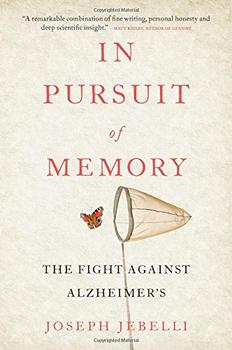Summary | Excerpt | Reviews | Beyond the Book | Readalikes | Genres & Themes | Author Bio

The Fight Against Alzheimer's
by Joseph Jebelli
But this wasn't enough for me. As time went on–as I moved through the ranks of postgraduate training, earning a doctorate in neuroscience and then becoming a postdoctorate researcher conducting independent research on neurodegeneration and mentoring my own students–I became convinced that studying Alzheimer's would require something more than what I could discover in the laboratory. A paradox of biological research is that its practitioners invariably succumb to a strange form of tunnel vision: the more we delve into a problem, the more sheltered we are from its wider reach. I wanted to meet other people like my grandfather and his family, dealing with Alzheimer's here and now, to tell the human story of this disease along with the scientific one.
Because more than anything, Alzheimer's is a disease that affects families. Its symptoms engulf those around it, causing emotional turmoil for family members who can do nothing but watch while their loved ones–hearts still pumping, breath still flowing, eyes still open–slowly slip away for ever. I wondered how others were coping with this. Did their stories bear any resemblance to what my own family went through? To find answers, I reached out to patients and families affected by the illness, including people with early-onset Alzheimer's who, after inheriting it from their parents, have had to make unimaginable decisions and sacrifices throughout their lives.
One of the first patients I met was eighty-four-year-old Arnold Levi. Arnold represents a typical case of Alzheimer's, and I listened as he and his carer, Danie, described the frighteningly tangible implications of this attack on Arnold's brain. It happened slowly at first. He'd forget the same kind of things many elderly people do: names, dates, paying the bills, stocking the fridge. Small things. Ordinary things. No one thought much of it, least of all Arnold. But over the course of a few years people did start to think about it. His friends noticed an intense and unshakable decline in his behaviour. He needed help getting dressed. He left taps running, the burner on the stove on, the front door unlocked. And of course, he wasn't trusted to drive any more.
And this was just the start. Over the next few years Arnold will become increasingly confused and agitated. His soaring level of forgetfulness and plummeting cognitive faculties will deeply frustrate him. Familiar people will seem like complete strangers. He may even frantically push them out the house, petrified by the 'intruder'.
Eventually, Arnold will no longer be able to speak, eat, drink or swallow. The most a loved one can hope for from the bedbound sufferer is the slightest quiver of comprehension from a tender touch or a cherished voice. Utterly robbed of his final years of life, Arnold will likely die of malnutrition or pneumonia, his mind now powerless to uphold the most primal rules of survival.
This is the horrifying reality of Alzheimer's. Scientists talk about Alzheimer's like detectives solving a crime–evidence versus speculation, deduction versus assumption, truth versus deception. We gather every clue we can before the brain cells we are studying vanish into thin air. At scientific meetings we ask questions about caveats and statistical significance. But Alzheimer's isn't like this for families. For us, it's something terrifying and abstract: an invisible thief, a long goodbye we now know is not just old age, but of which many people know little else. Meeting these families, I realised that they wanted answers from me as badly as I did from them.
One thing was clear: if they were going to enlighten me, I'd make sure I returned the favour. Intensely, I started reading everything I could about the disease. My desk filled with stacks of research articles and academic papers. My inbox flooded with emails about the news and contents of the most august scientific journals. I contacted all my scientific colleagues to learn how the field was changing, and to keep pace with the lightning speed of research. I travelled across the globe, visiting different laboratories, interviewing scientists and talking to patients and their families. I've had memory testing myself. I put all my powers of critical thinking from ten years of scientific training to the test. I was, in short, obsessed.
Excerpted from In Pursuit of Memory by Joseph Jebelli. Copyright © 2017 by Joseph Jebelli. Excerpted by permission of Little Brown & Company. All rights reserved. No part of this excerpt may be reproduced or reprinted without permission in writing from the publisher.
Education is the period during which you are being instructed by somebody you do not know, about something you do ...
Click Here to find out who said this, as well as discovering other famous literary quotes!
Your guide toexceptional books
BookBrowse seeks out and recommends the best in contemporary fiction and nonfiction—books that not only engage and entertain but also deepen our understanding of ourselves and the world around us.